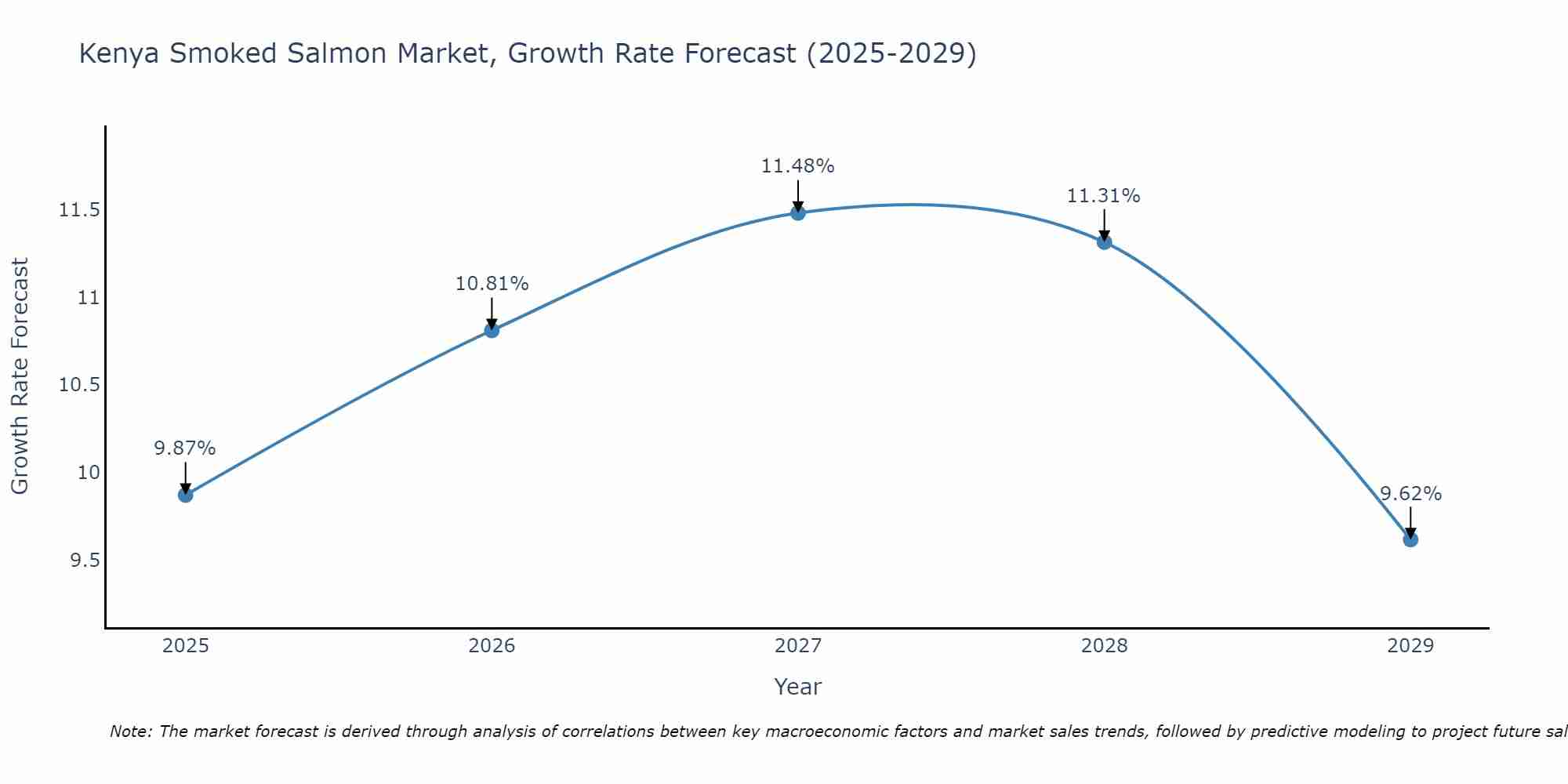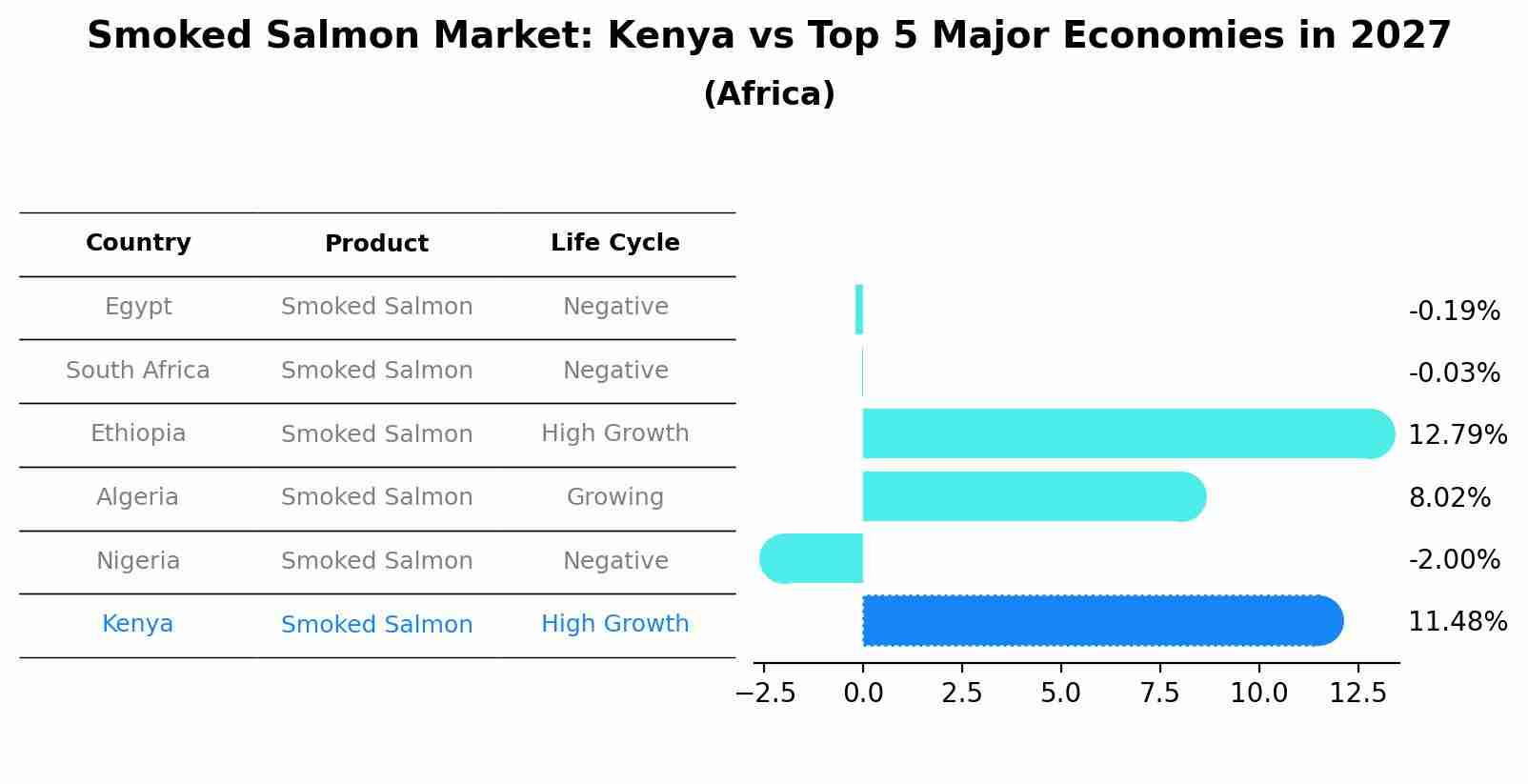Kenya Smoked Salmon Market (2025-2031) Outlook | Value, Size, Growth, Revenue, Companies, Analysis, Industry, Share, Forecast & Trends
| Product Code: ETC387890 | Publication Date: Aug 2022 | Updated Date: Jul 2025 | Product Type: Market Research Report | |
| Publisher: 6Wresearch | Author: Shubham Deep | No. of Pages: 75 | No. of Figures: 35 | No. of Tables: 20 |
Kenya Smoked Salmon Market Size Growth Rate
The Kenya Smoked Salmon Market is projected to witness mixed growth rate patterns during 2025 to 2029. Starting at 9.87% in 2025, the market peaks at 11.48% in 2027, and settles at 9.62% by 2029.

Smoked Salmon Market: Kenya vs Top 5 Major Economies in 2027 (Africa)
By 2027, Kenya's Smoked Salmon market is forecasted to achieve a high growth rate of 11.48%, with Egypt leading the Africa region, followed by South Africa, Ethiopia, Algeria and Nigeria.

Kenya Smoked Salmon Market Synopsis
The Kenya smoked salmon market is a niche segment within the country`s seafood industry, experiencing steady growth due to the increasing popularity of Western cuisine and a growing urban population with a taste for gourmet foods. Smoked salmon is considered a premium product in Kenya, primarily consumed in upscale restaurants, hotels, and by affluent consumers. The market is dominated by imported brands due to the lack of local production facilities, with European and American brands being the most preferred choices. However, there is a rising trend towards supporting local producers and sustainable sourcing practices, opening up opportunities for domestic players to enter the market and cater to the evolving consumer preferences for high-quality, ethically sourced smoked salmon products. Overall, the Kenya smoked salmon market presents potential for further expansion and diversification in the coming years.
Kenya Smoked Salmon Market Trends
In the Kenya Smoked Salmon Market, there is a notable trend towards increasing demand for premium and high-quality smoked salmon products. Consumers are becoming more health-conscious and are seeking nutritious and protein-rich food options, making smoked salmon a popular choice due to its perceived health benefits. Additionally, there is a growing trend towards incorporating smoked salmon into various culinary dishes beyond traditional breakfast or brunch options, such as salads, pasta, and sushi rolls, driving its versatility and appeal among food enthusiasts. The market is also witnessing a rise in the availability of locally sourced and sustainably produced smoked salmon products, aligning with the consumer preference for ethically sourced and environmentally friendly food options. Overall, the Kenya Smoked Salmon Market is experiencing growth driven by evolving consumer preferences towards premium, healthy, and sustainable food choices.
Kenya Smoked Salmon Market Challenges
In the Kenya Smoked Salmon Market, several challenges are faced, including high production costs due to the importation of raw salmon, limited awareness and consumption of smoked salmon among the local population, and competition from alternative protein sources such as tilapia and Nile perch. Additionally, logistical challenges in terms of transportation and storage of the perishable product, as well as inconsistent supply of quality raw materials, pose hurdles for market players. Moreover, regulatory hurdles and certification requirements related to food safety standards and importation further complicate the market landscape. Overall, addressing these challenges requires strategic marketing efforts to educate consumers, streamline supply chain processes, and potentially explore local sourcing options to enhance competitiveness and sustainability in the Kenya Smoked Salmon Market.
Kenya Smoked Salmon Market Investment Opportunities
In the Kenya Smoked Salmon Market, there are promising investment opportunities for companies looking to capitalize on the growing demand for premium seafood products. With an increasing number of consumers in Kenya showing a preference for healthy and high-quality food options, there is a niche market for smoked salmon that offers a gourmet and nutritious choice. Investing in the production and distribution of smoked salmon in Kenya could be lucrative, especially by leveraging sustainable sourcing practices and innovative packaging to appeal to environmentally conscious consumers. Additionally, partnering with local fisheries or aquaculture farms to ensure a consistent and fresh supply of salmon could further enhance the market position and profitability of such investments in the Kenya Smoked Salmon Market.
Jordan Agar Market Government Policies
The Kenyan government has implemented various policies related to the Smoked Salmon Market to ensure food safety and quality standards are met. The Kenya Bureau of Standards (KEBS) regulates the importation, production, and distribution of smoked salmon products to safeguard consumer health. Additionally, the Ministry of Agriculture supports initiatives to promote sustainable fishing practices and strengthen the aquaculture sector to reduce reliance on imported smoked salmon. The government also encourages local producers to comply with international standards to enhance export opportunities and improve market competitiveness. Overall, these policies aim to regulate the Smoked Salmon Market in Kenya, promote food safety, and support the growth of the domestic seafood industry.
Kenya Smoked Salmon Market Future Outlook
The Kenya Smoked Salmon market is poised for significant growth in the coming years due to increasing consumer demand for premium and healthy food options. Factors such as rising disposable incomes, changing dietary preferences, and a growing awareness of the health benefits of seafood are driving the popularity of smoked salmon in Kenya. Additionally, the influence of Western cuisine and a growing foodservice industry are expected to further boost the market. With a focus on quality, sustainability, and innovation in product offerings, key players in the market have the opportunity to capitalize on this growing demand and expand their market share. Overall, the future outlook for the Kenya Smoked Salmon market appears promising, with ample opportunities for growth and development.
Key Highlights of the Report:
- Kenya Smoked Salmon Market Outlook
- Market Size of Kenya Smoked Salmon Market, 2024
- Forecast of Kenya Smoked Salmon Market, 2031
- Historical Data and Forecast of Kenya Smoked Salmon Revenues & Volume for the Period 2021 - 2031
- Kenya Smoked Salmon Market Trend Evolution
- Kenya Smoked Salmon Market Drivers and Challenges
- Kenya Smoked Salmon Price Trends
- Kenya Smoked Salmon Porter's Five Forces
- Kenya Smoked Salmon Industry Life Cycle
- Historical Data and Forecast of Kenya Smoked Salmon Market Revenues & Volume By Type for the Period 2021 - 2031
- Historical Data and Forecast of Kenya Smoked Salmon Market Revenues & Volume By Vac/Vacuum Packing for the Period 2021 - 2031
- Historical Data and Forecast of Kenya Smoked Salmon Market Revenues & Volume By Vac/Vacuum Packing Covered With Cardboard Envelope for the Period 2021 - 2031
- Historical Data and Forecast of Kenya Smoked Salmon Market Revenues & Volume By Canned Packaging for the Period 2021 - 2031
- Historical Data and Forecast of Kenya Smoked Salmon Market Revenues & Volume By Application for the Period 2021 - 2031
- Historical Data and Forecast of Kenya Smoked Salmon Market Revenues & Volume By Food Service Sector for the Period 2021 - 2031
- Historical Data and Forecast of Kenya Smoked Salmon Market Revenues & Volume By Retail Sector for the Period 2021 - 2031
- Kenya Smoked Salmon Import Export Trade Statistics
- Market Opportunity Assessment By Type
- Market Opportunity Assessment By Application
- Kenya Smoked Salmon Top Companies Market Share
- Kenya Smoked Salmon Competitive Benchmarking By Technical and Operational Parameters
- Kenya Smoked Salmon Company Profiles
- Kenya Smoked Salmon Key Strategic Recommendations
Frequently Asked Questions About the Market Study (FAQs):
- Single User License$ 1,995
- Department License$ 2,400
- Site License$ 3,120
- Global License$ 3,795
Search
Thought Leadership and Analyst Meet
Our Clients
Related Reports
- Afghanistan Apparel Market (2026-2032) | Growth, Outlook, Industry, Segmentation, Forecast, Size, Companies, Trends, Value, Share, Analysis & Revenue
- Canada Oil and Gas Market (2026-2032) | Share, Segmentation, Value, Industry, Trends, Forecast, Analysis, Size & Revenue, Growth, Competitive Landscape, Outlook, Companies
- Germany Breakfast Food Market (2026-2032) | Industry, Share, Growth, Size, Companies, Value, Analysis, Revenue, Trends, Forecast & Outlook
- Australia Briquette Market (2025-2031) | Growth, Size, Revenue, Forecast, Analysis, Trends, Value, Share, Industry & Companies
- Vietnam System Integrator Market (2025-2031) | Size, Companies, Analysis, Industry, Value, Forecast, Growth, Trends, Revenue & Share
- ASEAN and Thailand Brain Health Supplements Market (2025-2031) | Strategy, Consumer Insights, Analysis, Investment Trends, Opportunities, Growth, Size, Share, Industry, Revenue, Segments, Value, Segmentation, Supply, Forecast, Restraints, Outlook, Competition, Drivers, Trends, Demand, Pricing Analysis, Competitive, Strategic Insights, Companies, Challenges
- ASEAN Bearings Market (2025-2031) | Strategy, Consumer Insights, Analysis, Investment Trends, Opportunities, Growth, Size, Share, Industry, Revenue, Segments, Value, Segmentation, Supply, Forecast, Restraints, Outlook, Competition, Drivers, Trends, Demand, Pricing Analysis, Competitive, Strategic Insights, Companies, Challenges
- Europe Flooring Market (2025-2031) | Outlook, Share, Industry, Trends, Forecast, Companies, Revenue, Size, Analysis, Growth & Value
- Saudi Arabia Manlift Market (2025-2031) | Outlook, Size, Growth, Trends, Companies, Industry, Revenue, Value, Share, Forecast & Analysis
- Uganda Excavator, Crane, and Wheel Loaders Market (2025-2031) | Strategy, Consumer Insights, Analysis, Investment Trends, Opportunities, Growth, Size, Share, Industry, Revenue, Segments, Value, Segmentation, Supply, Forecast, Restraints, Outlook, Competition, Drivers, Trends, Demand, Pricing Analysis, Competitive, Strategic Insights, Companies, Challenges
Industry Events and Analyst Meet
Whitepaper
- Middle East & Africa Commercial Security Market Click here to view more.
- Middle East & Africa Fire Safety Systems & Equipment Market Click here to view more.
- GCC Drone Market Click here to view more.
- Middle East Lighting Fixture Market Click here to view more.
- GCC Physical & Perimeter Security Market Click here to view more.
6WResearch In News
- Doha a strategic location for EV manufacturing hub: IPA Qatar
- Demand for luxury TVs surging in the GCC, says Samsung
- Empowering Growth: The Thriving Journey of Bangladesh’s Cable Industry
- Demand for luxury TVs surging in the GCC, says Samsung
- Video call with a traditional healer? Once unthinkable, it’s now common in South Africa
- Intelligent Buildings To Smooth GCC’s Path To Net Zero


















